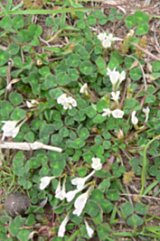
Subterranean clover
| Name: |
Subterranean Sub Clover (Trifolium subterraneum) |
||||||||||||||||||||||||||||||||||||||||||||||||||||||||||||||||||||||||||||||||||||||||||||||||||||||||||||||||||||||||||||||||||||||||||||||||
|---|---|---|---|---|---|---|---|---|---|---|---|---|---|---|---|---|---|---|---|---|---|---|---|---|---|---|---|---|---|---|---|---|---|---|---|---|---|---|---|---|---|---|---|---|---|---|---|---|---|---|---|---|---|---|---|---|---|---|---|---|---|---|---|---|---|---|---|---|---|---|---|---|---|---|---|---|---|---|---|---|---|---|---|---|---|---|---|---|---|---|---|---|---|---|---|---|---|---|---|---|---|---|---|---|---|---|---|---|---|---|---|---|---|---|---|---|---|---|---|---|---|---|---|---|---|---|---|---|---|---|---|---|---|---|---|---|---|---|---|---|---|---|---|---|---|
| Description: |
A self-regenerating annual. Grows mainly in autumn, winter and spring. Suited to moderately acid to neutral soils. Best suited legume for large areas of southern New South Wales. Resists grazing as seeds are buried. Ensure reliable seed set and improved persistence by using the most suitable variety for a particular district. Mixtures of varieties can be used to take advantage of extended seasons, for example, by including a slightly longer-season (later maturing) variety, and improve persistence by including a slightly shorter-season (early maturing) variety that has a higher proportion of hard seed. (The subterranean clover varieties are listed from late to early maturity). Sow in early to late autumn. |
||||||||||||||||||||||||||||||||||||||||||||||||||||||||||||||||||||||||||||||||||||||||||||||||||||||||||||||||||||||||||||||||||||||||||||||||
| Sowing rate: |
4–10 kg/ha. Inoculant Group C. |
||||||||||||||||||||||||||||||||||||||||||||||||||||||||||||||||||||||||||||||||||||||||||||||||||||||||||||||||||||||||||||||||||||||||||||||||
| Minimum average annual rainfall: |
375 mm Southern NSW to 600 mm Northern NSW. | ||||||||||||||||||||||||||||||||||||||||||||||||||||||||||||||||||||||||||||||||||||||||||||||||||||||||||||||||||||||||||||||||||||||||||||||||
| Select varieties on the basis of: |
Type of sub clover: Subterranean sub clovers are adapted to neutral to moderately acid soils; Brachycalycinum sub clovers are best suited to neutral to alkaline soils; Yanninicum types of sub clover are especially suited to poorly drained waterlogged soils. Hard seed levels: High hard seed levels are desirable where persistence is needed in drier parts of the sub clover zone. Low levels suit higher rainfall areas with late maturing varieties (see Maturity: Use earlier maturing varieties in drier more marginal areas, and later maturing varieties where spring rainfall is reliable (see Appendix VI). Phytophthora root rot: Root rot tolerance is important in poorly drained soils in high rainfall areas and under irrigation. There are three known races of Phytophthora root rot. Varieties with resistance to less than all three races are designated as partially resistant in the table. Production potential: Especially winter production (very dependent on plant density). Long season production is important where late spring conditions occur or where irrigation is available - seek local results where available Oestrogen levels: Do not grow older varieties as some varieties (e.g. Dwalganup, Yarloop) can have high levels of plant oestrogens that may result in livestock infertility. All listed varieties have low levels and are unlikely to cause clover disease in sheep. Other diseases: e.g. clover scorch in particular may be a problem in higher rainfall districts. |
||||||||||||||||||||||||||||||||||||||||||||||||||||||||||||||||||||||||||||||||||||||||||||||||||||||||||||||||||||||||||||||||||||||||||||||||
| Seed available: |
|
||||||||||||||||||||||||||||||||||||||||||||||||||||||||||||||||||||||||||||||||||||||||||||||||||||||||||||||||||||||||||||||||||||||||||||||||


